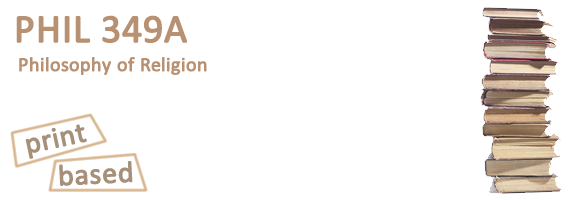
Mode of Delivery
This is a print-based, correspondence course.
Course Description
This course is a critical and analytical examination of arguments for and arguments against the existence of God, and other related topics.
Philosophy of religion is the philosophical examination of the doctrines, or claims, expressed within the central texts of the world’s religions, or by important exponents of the world’s religions. In this course, a representative selection of basic issues will be studied, including: the existence of a Supreme Personal God; the existence of an impersonal Absolute Being, or Impersonal God; religious experience in general and mystical experience in particular; secularist versus religious perspectives.
Intended Audience
This course is intended for students in their third year, or beyond, of university studies. There is no philosophy prerequisite for Philosophy 349A.
Course Objectives
Upon completion of Philosophy 349A, you will be able to:
- distinguish among four world views:
- authoritarian theism;
- non-authoritarian theism;
- non-theistic sacralism;
- secular humanism;
- grasp that each of above is, or may be, found expressed within each of the main religious traditions of the world;
- assess the strengths and weaknesses of these positions with regard to:
- direct experiential evidence of the presence of a Supreme Personal Being;
- evidence provided by allegedly or apparently miraculous experiences or events;
- evidence provided by allegedly or apparently miraculous experiences or events;
- other evidence of, or arguments for, a Supreme Personal Being;
- evidence of, or arguments for, an Absolute Impersonal Being; and
- non-theistic religious experience, including mystical experience, and non theistic of religious life.
Course Overview
The Philosophy 349A course content is divided into 11 lessons, preceded by a section that introduces you to the discipline of philosophy of religion.
Lesson 1 outlines the tools of reasoning needed for the course.
Lesson 2 introduces some philosophical terms that are frequently used in many disciplines of philosophy including philosophy of religion.
Lesson 3 introduces the central concepts discussed in religious philosophy such as ‘nature,’ ‘God,’ ’cause,’ ‘person,’ ‘experience.’
Lesson 4 describes four main world views we find argued in the world today with regard to religious questions.
Lesson 5 discusses the differences among evidential, volitional, and basic beliefs, and explains that we will be concerned with assessing evidential religious beliefs.
Lesson 6 introduces some readings on experiential evidence for and against the existence of benevolent spiritual beings, and in particular, the Supreme Personal God.
Lesson 7 discusses the concept of a miracle and the assessment of evidence for such possible events.
Lesson 8 presents various versions of the argument from design.
Lesson 9 introduces you to the cosmological argument and the ontological argument.
Lesson 10 examines four types of non-theistic religious thinking, including mysticism.
Lesson 11 reviews some of the main questions considered during the course, and introduces the moral argument for the Supreme Personal Being, as well as the ‘cumulative case argument’ for the Supreme Personal Being. Lesson 11 also focuses the material in such a way that you will be able to assess the three main religious views against secularism.
Self-Test Exercises
Those lessons without a graded assignment contain a self-testing exercise. In each self-test exercise a question will be given or a problem will be described. Then you will have an opportunity to answer the question or resolve the problem. After you have attempted the question or problem you can look up the answers in the back of the course manual, so that you can gauge your grasp of the problem.
Assignments
There are five graded assignments in Philosophy 349A. The first assignment is a ‘tools of thinking’ assignment, the other four are essay assignments.
Final Examination
The final examination will consist of ten questions answerable in a short paragraph or two. These questions will allow you to show your ability to use the basic concepts of the course, and your familiarity with the basic issues of the course.
Evaluation
| Five assignments | 68% |
| Final Exam | 32% |
|
Total
|
100% |
50% is a passing grade in most faculties.
Textbooks and Course Materials
- Peterson, Michael, et al., eds. Reason & Religious Belief. 4th ed. Oxford: Oxford UP, 2008.
- Kurtz, Paul. The Transcendental Temptation: A Critique of Religion and the Paranormal. Buffalo, NY: Prometheus Books, 1986.
- PHIL 349A Learner Package (includes course manual).
- PHIL 349A Custom Course Materials (Book of Readings)
